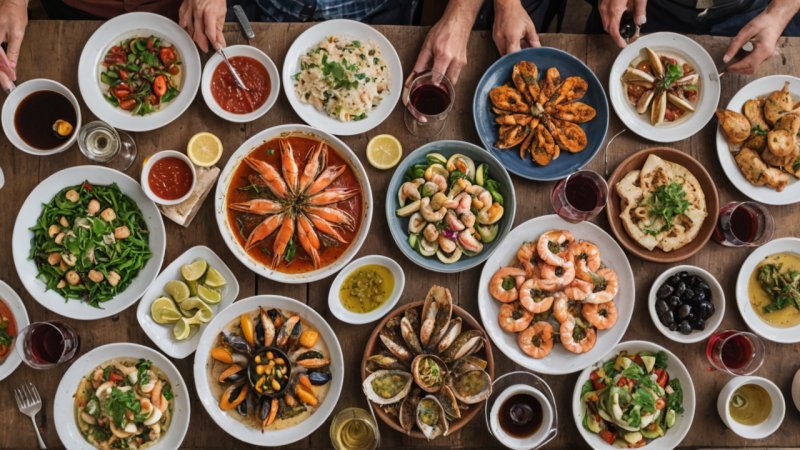The Mediterranean Islands are a treasure trove of culinary delights, each with unique flavors and traditions. From the fresh seafood of Sardinia to the aromatic spices of Malta, these islands offer an array of dishes that reflect their rich cultural heritage. Here, we address some common questions about the culinary traditions of these beautiful islands.
What are the main ingredients used in Mediterranean island cuisine?
The cuisine of the Mediterranean Islands heavily relies on fresh, local ingredients. Common staples include:
- Seafood: Fish and shellfish are abundant due to proximity to the sea.
- Olive Oil: A key ingredient used in cooking and dressing salads.
- Fresh Vegetables: Tomatoes, eggplants, and peppers are commonly used.
- Herbs and Spices: Basil, oregano, and saffron add flavor to many dishes.
- Cheese: Various local cheeses, such as feta and pecorino, are essential.
What are some traditional dishes from the Mediterranean Islands?
Each island boasts its own specialties, but some popular traditional dishes include:
- Fregola: A Sardinian pasta similar to couscous, often served with seafood.
- Pastizzi: A flaky pastry filled with ricotta or peas, popular in Malta.
- Spanakopita: A Greek pie made with spinach and feta, commonly enjoyed across the islands.
- Caprese Salad: A simple salad from Capri made with fresh mozzarella, tomatoes, and basil.
- Ratatouille: Originally from Provence, this vegetable dish is popular in many Mediterranean regions.
What beverages are popular in the Mediterranean Islands?
Alongside the food, beverages also play a significant role in the culinary experience:
- Wine: The islands produce a variety of wines, with local varieties being a must-try.
- Ouzo: A traditional Greek anise-flavored aperitif.
- Raki: A popular Turkish alcoholic drink, often enjoyed with meze.
- Cider: Especially in Corsica, locally fermented ciders are common.
- Herbal Teas: Made from local herbs, these teas are popular for both flavor and health benefits.
How can I experience the culinary traditions of the Mediterranean Islands?
Experiencing the culinary traditions can be done in several ways:
- Food Tours: Join guided food tours to sample local dishes and learn about their history.
- Cooking Classes: Participate in cooking classes to learn how to prepare traditional meals.
- Local Markets: Visit local markets to discover fresh ingredients and local specialties.
- Festivals: Attend food festivals celebrating local cuisine, such as the Sagra in Italy or the Festa in Malta.
- Restaurants: Dine at local restaurants that focus on traditional dishes and local ingredients.
Are there any dietary restrictions to consider in Mediterranean island cuisine?
While Mediterranean cuisine is generally healthy, there are some dietary concerns:
- Seafood Allergies: Many dishes contain seafood, so those with allergies should be cautious.
- Gluten Sensitivity: Some traditional dishes may contain gluten; however, many islands offer gluten-free options.
- Vegetarian/Vegan Options: Many dishes are vegetable-based, but it's good to inquire about dairy.
- Halal/Kosher: Some islands have specific dining options for these dietary laws.
What is the best time of year to experience the culinary traditions of the Mediterranean Islands?
The best time to visit varies by island, but generally:
- Spring (April to June): Ideal for mild weather and fresh produce.
- Summer (July to August): Popular but hot; great for beachside dining.
- Fall (September to November): Harvest season, perfect for wine and food festivals.
- Winter (December to March): Less crowded but some restaurants may close; great for local specialties.
In summary, the culinary traditions of the Mediterranean Islands are a captivating blend of flavors, techniques, and rich history. Whether you are indulging in local dishes, sipping regional wines, or participating in food-related activities, each island offers a unique taste of its culture. Exploring these culinary delights will undoubtedly enhance your travel experience.






